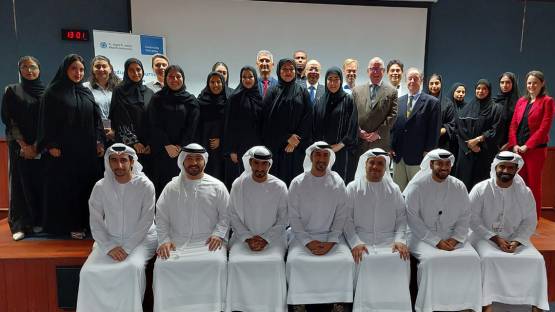IAEA legal experts have delivered the Agency’s first-ever short introductory course on nuclear law for university students, at Khalifa University in the United Arab Emirates (UAE). Attended by students from different academic disciplines, as well as officials and representatives of the University faculty from 7 to 8 December 2022, this is the first such course in a series, with five more universities around the world to follow as hosts of this course in the coming months.
The short course is offered as part of the implementation of pilot partnerships concluded between the IAEA and six universities in Argentina, Brazil, Egypt, Jamaica, South Africa and the UAE, an initiative launched by IAEA Director General Rafael Mariano Grossi at the Agency’s First International Conference on Nuclear Law last year. It aims to increase educational and professional development opportunities for students and aspiring professionals in the field of nuclear law in IAEA member countries.
Under the initiative, the IAEA will support the universities in establishing a postgraduate certificate programme on nuclear law within their existing curricula, which will be open to students and professionals from diverse academic backgrounds, including law, science and technology, engineering, policy, and communications, thereby building a bridge between professionals in legal and non-legal fields.
“Given the important role of higher education and research in supporting the nuclear power programme and deployment of nuclear energy in the UAE, we highly appreciate the IAEA’s timely and crucial support in building the university’s educational capacities in the field of nuclear law,” said Professor François Foulon, Director of the Emirates Nuclear Technology Centre and Chair of the Nuclear Engineering Department. He highlighted the current partnership between the IAEA and the university, which since 2017 has been an IAEA Designated Collaborating Centre.
Wolfram Tonhauser, Head of the IAEA's Nuclear and Treaty Law Section in the Office of Legal Affairs, who led the team of experts, underscored the significance of the partnership against a background of evolving nuclear technology and in the context of advancing the teaching and dissemination of nuclear law.
“I wish, especially, to stress the interdisciplinary character of the postgraduate certificate programme on nuclear law that the IAEA is supporting the university in establishing,” he said, “and I encourage all the participants, whether from a legal or a science and engineering background, to pursue this programme, as an opportunity to strengthen professional experience.”
The short course provided the participants with an introduction to nuclear law, including the history and work of the IAEA; and the four pillars of international and national nuclear law, namely nuclear safety, nuclear security, safeguards and civil liability for nuclear damage. It also covered the elements of comprehensive national nuclear law; the IAEA Legislative Assistance Programme; nuclear law and its relationship with other areas of law, and the impact of new and advanced nuclear technologies on nuclear law.
The initiative is being implemented within the framework of the IAEA Legislative Assistance Programme, which is supported by the Agency’s Technical Cooperation Programme.






